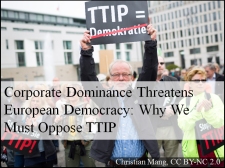Commentary by Sarah HARVEY-KELLY
“A high level of human health protection shall be ensured in the definition and implementation of all Union policies and activities” – Article 168, Treaty of Lisbon
The Eurozone Crisis, Ukraine–Russian tensions, Greek debt, the Refugee Crisis, and possible Brexit. It’s fair to say that EU has seen its fair share of criticisms over the last few years. What was once thought to bring further prosperity, stability and unity has challenged the EU and its institutions. However there seems to be another European Commission proposal that might challenge it even further. Advertised as one of the biggest trade deals and global economic turning points of the century, TTIP and its Canadian cousin trade talks (aka CETA), have been heavily criticised as ultimately threatening the EU and it’s Member State’s (MS) sovereignty and democracy. In case that isn’t worrying enough for the ordinary European citizen, further criticisms have included threat to publicly owned services, global warming and public health, inviting nicknames such as the deal that allows “corporate businesses to write our laws”, “the [healthcare] privatisation deal”, and my personal favourite, the deal that will “force chlorine-soaked chickens down European throats”.

TTIP is not the first Free Trade Agreements (FTA) that has sparked criticism and attracted sceptics from the public health fields. But it is the first FTA that has involved more structured ad hoc consultations with stakeholders and wider society. Although participation with stakeholders has remained limited due to logistical reasons, the result of this broad negotiation process means it is also the first FTA that has had to consider broader stakeholders and elements outside of economic development such as public health. The EU and it’s MSs together boast some of the highest standards of health and healthcare in the world, and given current emerging health trends, they remain highly committed to maintaining it. However various elements of TTIP have been criticised for threatening the EU’s public health. Nonetheless, many of these criticisms are unpredictable and unforeseeable.
The first proposed concerns tariff reductions on agri-food products and will aim to reduce food prices, especially on processed foods. This will indeed affect European citizens’ diet and health, ultimately undermining Europe’s current efforts to reduce chronic diseases caused by already unhealthy eating and lifestyle habits. However, only a few studies have suggested a relationship with tariff reductions from previous FTAs and increase of unhealthy food consumption. Even if this were the case, MS’s public health bodies would still have the mandate to set regulatory measures and policies on the national level to: a) reduce unhealthy ingredients such salt and sugar; and, b) promote healthy lifestyles. Additionally the EU also maintains high food and consumer safety standards, which will not change as a result of TTIP either. This also explains why GMO agri-products will not be imported to Europe, which the EU still strongly opposes. In fact, TTIP does not aim to modify food safety standards in the EU or the US, but aims to facilitate trading between them based on mutual recognition of existing standards.

The most controversial element of the agreement that has sparked public scepticism is that publicly run services will be opened up to the private sector, although many member states have asked to “exempt” public services, including healthcare which, in theory, are not suitable for “traditional” market competition. Notwithstanding this, no single health system in the EU lies completely in the hands of the public sector. Even the UK who pioneered in its health system after World War II, and boasts a “traditional” NHS model of healthcare, has been outsourcing many of its services to the private sector since the 1970s, including infrastructure and management services. Additionally, the exemption clause that was recently added into TTIP offers member states “soft exclusion” rather than “hard exclusion” or “carve out”, meaning many of the MSs will have to explicitly decide if and how much of their health system should excluded. So far no MS has formally set out its position, except for the UK who has suggested they may not exclude many parts of their health system.
If service trading seemed controversial enough, then nothing could out-win ISDS, the culprit of the extending TTIP talks. Under WTO regulation, ISDS is already present in the Bilateral Investment Treaties (BITs) between EU member states and the US, however to date no ISDS has taken place. What TTIP proposes further, is to increase protection against inappropriate claims. A report published by the British Parliament found that the USA had the highest ISDS claims against it globally, whereas ISDS claims in Europe were between MSs. Whilst this topic has been extensively debated, ISDS towards health services would be highly unlikely, although not impossible. One area it could impact health services is in public procurement and the ability of governments to bring previously privatised sectors into the state sector, allowing companies who owned such services to claim ‘indirect appropriation’ of future profits if services were to return to the public sector.
The question of TTIP is a difficult one, regardless of which sector you are coming from. Like many trade agreements, the ultimate aim of TTIP is to increase competition, trade and boost the economy. Unfortunately the outcomes in terms of health and health system performance will not be visible in a fortnight. Despite its challenges, if there is anything that Europe has managed to do in the last 60 years, it is to create a more mobile, educated and healthier society – the building blocs of an economically sustainable society. Europe has every interest to maintain this reputation, but whether TTIP will significantly change this is unknown.
RELATED ARTICLES:





